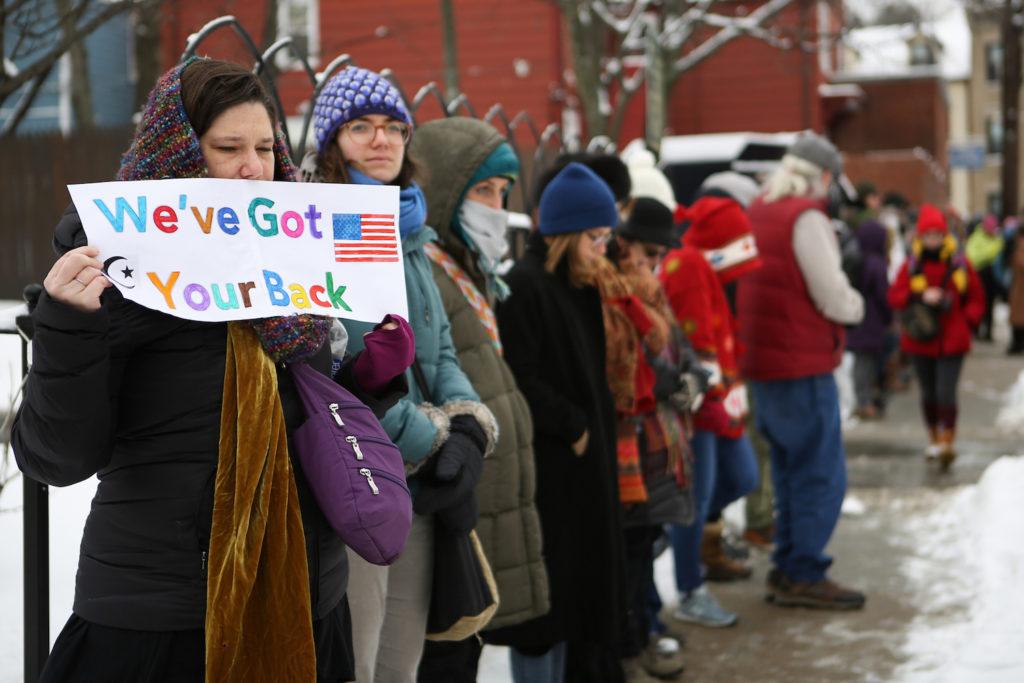By Janette Ebbers, news correspondent
More than 300 protesters stood in silence on the sidewalk outside Roxbury’s Islamic Society of Boston Cultural Center (ISBCC) on Sunday during afternoon prayer in solidarity with the Muslim community.
Richard Inonog and Andress Bonifacio, the event’s organizers, stated the goal of the protest on their Facebook event: To build a “human wall of compassion” around the mosque. The human wall was a silent protest; the organizers asked protesters to only bring signs reading, “We’ve Got Your Back.”
During the protest, some members of the mosque came out to thank and shake hands with the protesters. After the event, protesters were ushered into the mosque, where members brewed coffee and handed out fruit.
Inonog said the protest was partially spurred by the Jan. 29 shooting at the Islamic Cultural Center in Quebec, where six Muslims were killed.
“It was a reaction after the Quebec attacks,” Inonog said. “I woke up and then found out about what happened […] and I needed to do something. I grew up in a family of activists, so I’m pretty used to some sort of organization.”
Inonog said the event was modeled after a 2013 protest in Istanbul, where Erdem Gündüz enacted a “standing man” method of resistance, inciting other Turkish protesters to stand in solidarity with him.
“I think it’s really powerful,” Inonog said. “Apparently the authorities and the cops were just really confused on what to do with them because they’re so used to protests being violent and loud. So, having a silent protest is a really different approach.”
Lilian Kology, a 31-year-old artist who participated in the silent protest, emphasized the importance of standing with marginalized groups.
“I’m here in solidarity with Muslim people,” Kology said. “It feels really important to show that publicly. I think there’s a lot of effort on the right to kind of pick apart different marginalized groups, and I think the more public solidarity we show, the more culturally safe and comfortable it’ll be, even just on a local level.”
Jacob Walters, a 68-year attorney from Brookline, said solidarity is particularly important in light of recent circumstances surrounding the Muslim community.
“That whole concept of if we don’t stand up for people, whoever they may be […] then no one will stand up for us,” Walters said, referencing the famous World War II era poem “First they came…” which spoke about the importance of resistance while there are people left to resist.
Jennifer Grace, a 56-year-old Boston resident, said her experience with the Muslim community, especially refugees, was consistent with the kindness shown to the protesters.
“They are just amazing people and they deserve to have every break,” Grace said. “They’re kind, they’re hard-working, they’re educated; we would be well-served in the United States to bring them here, welcome them. All they want to do is flee the terror and conflict, which is beyond atrocious and beyond our comprehension.”
Grace, a retired nurse, has been on medical missions to the Middle East six times.
“To be respectful of different religions, and to honor that – that’s what America is,” Grace said. “That’s what we’re all about.”
Walters also addressed the importance of remaining unbiased toward the Muslim community in the face of Islamist extremism.
“I’m less fearful of [Muslims] than I am of some people in Florida who want to burn the Quran and all that – they scare me more than the Muslim community does,” he said. “Every religion probably has their fringe crazies, but to pick on one, I think, is horrible.”
Walters also said the protest was personal as well as political.
“What we will accomplish, I hope, if nothing more, is to make the people in this mosque and in this community feel like people care about them,” Walters said. “That’s enough for me.”
Photo by Dylan Shen









